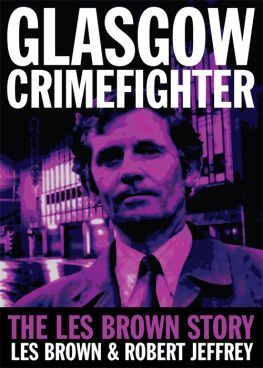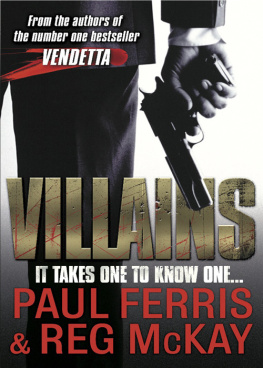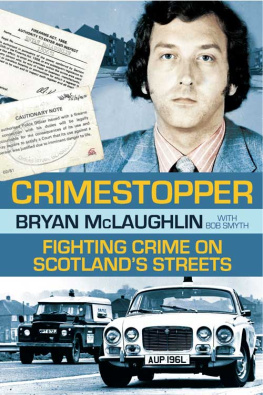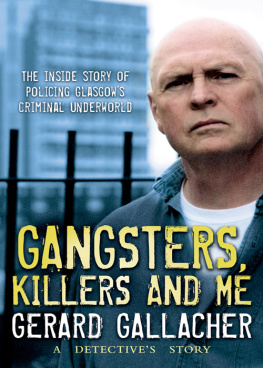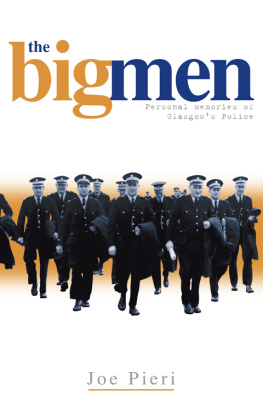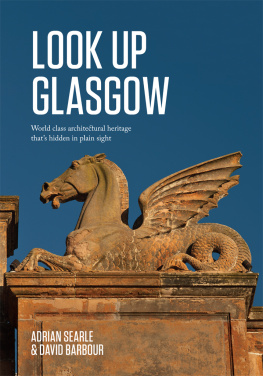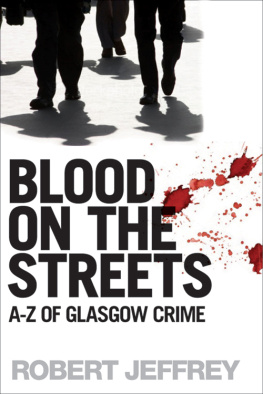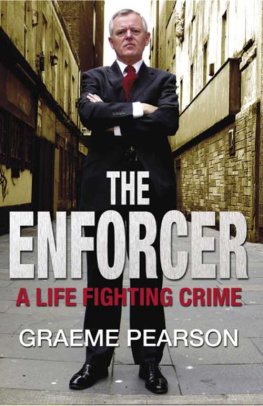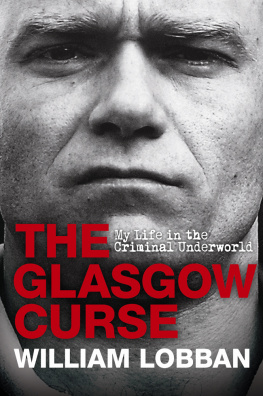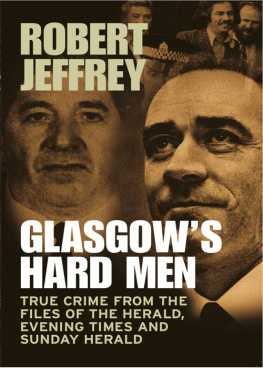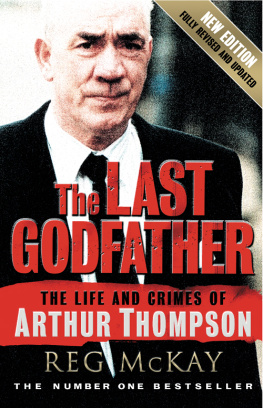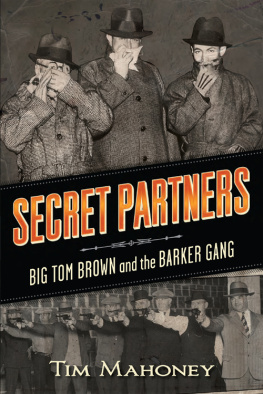This book is dedicated to police officers everywhere.
Les Brown and Robert Jeffrey would like to thank colleagues in the police and the press, Sheila Brown and Marie Jeffrey and the staff of the Daily Record and Newsquest (publishers of The Herald, Sunday Herald and Evening Times) for their assistance in the production of this book.
LB & RJ
CONTENTS
A success for good old-fashioned policing it's a phrase that has become something of a clich to be mouthed by top cops at the conclusion of a big murder trial. But it contains an element of truth, as I well know. Many a case is solved by sheer relentless detective work during which every door in the neighbourhood of the crime scene is knocked on by tireless plain-clothes and uniformed officers at all hours and in all weathers. Every dank tenement staircase climbed. Every lead, however unlikely, followed up. The usual suspects are rounded up. Every possible connection interviewed. Neighbours, workmates, folk in the local shops, pubs, golf club, bowling club, cinemas all are quizzed. Wanted bills are printed by the helpful local press.
This is the Glasgow detective's equivalent of saturation bombing and it can work. Often what is called a result is achieved and, at the end of a long slog, the investigating force can enjoy the feeling of satisfaction that comes when the gates of Barlinnie or Peterhead slam behind a villain. The celebration cup of tea on occasion laced with a drop of something stronger back at the station tastes sweet. It is one face of policing and it is a familiar one to the tabloid readers who follow, daily, the war between the boys in blue and the criminal fraternity in this city, a place some observers have dubbed the Chicago of north-west Europe. But it is only one of several faces some of which are benign, others disgraceful.
There is a pleasing face of successful policing, the intuitive leap of deduction brought on by years of experience and the ability to see into the criminal mind in a way that comes from a life spent rubbing against the villains. In this, my tale of more than twenty years as a detective, there are many examples of just that occasions when my colleagues and I instinctively headed in the right direction when faced with a puzzling case. You can't beat experience. I found it interesting, for example, that, when the CID are called in, those in the uniformed branch, who are often the first on the scene, just don't know where to start and are sometimes slow to grasp the significance of simple little matters the tiny clues that point in the direction of a solution. The same happens when the sleuths from the big city are taken out of the tenements and schemes into the countryside to investigate a rare crime in farmland areas or a market town. And it is no wonder this is so the rural cops might only see a murder once every few years but, here in Glasgow, you could have a couple of bloody killings on your hands before breakfast. I remember one New Year when we solved four killings albeit fairly simple cases mostly arising out of drunken rammies in the space of a day and still had time to enjoy a bite of turkey and a glass or two before heading home.
The student of detective fiction knows, from the days of Sherlock Holmes to TV's Colombo onwards, that it is often the sum of little things that points to the big truth. Incidentally, most real-life detectives enjoy a thriller on the TV as much as the next man. And, when I look at my scrapbook pictures of Glasgow CID's finest in action in the fifties and sixties, I reflect that Peter Falk didn't have the copyright on shabby gabardine raincoats and turned-up collars! Or the trademark battered felt hats.
But it is a sad fact that dogged detection and brilliant leaps of intuition are not the complete face of police work in this part of the world. There are also stitch-ups and cover-ups and, inevitably, outrageous miscarriages of justice. Glasgow has had more than its share. The convictions of Oscar Slater, Paddy Meehan and Joe Steele and his co-accused, big TC Campbell, are the most obvious. These were men incarcerated and, in one case, nearly hanged by the neck till he was dead for long years on what the TV detectives would call bum raps. Serious bum raps! I have had my own share of controversy the Albany drugs trial for a start (there is more, much more, of that later in this book). But I was never a fit-up merchant, though I have met some in more than twenty years as a crimefighter in Glasgow. It is my view that the bent cop deserves to be exposed. Cover-ups are an insult to the brave majority of officers who risk their lives and sometimes that of family members working long hard hours to try to contain the villains and let the citizens sleep peacefully of a night. When they succeed, they deserve the praise of the public and the media. When they step out of line, they should be hammered hard and without pity.
Now, despite what any of my ex-colleagues might tell you, I was not personally involved in the Slater case it began in 1908 after all! This particular fit-up is often said to be the worst of all these miscarriages and I suppose that is so since it came so close to ending on the gallows. Interestingly, it has connections with some of the modern miscarriages. Slater was a German Jew who just happened to be in the wrong place at the wrong time and he suffered the bigotry of his era as well as becoming the victim of incompetent, malicious policing. The cover-up by the authorities lasted for years shades of what was to happen to Steele and Campbell in the Ice-Cream Wars.
The victim in the Slater case was a rich eighty-three-year-old spinster who had cash and jewellery, about three thousand pounds worth, an enormous sum for those days, stashed in her west-end flat. Not wise! Even today, it is not a clever move to have large sums of readies and attractive pickings like precious stones lying around your Glasgow home. It is even more reckless to let people know that it is there. Right now, I could name you half a dozen or so badfellas who would be up the tenement stairs two at a time after such a haul and to hell with the fact that someone might die.
The crime that led to the Slater stitch-up was never solved and, to this day, no one knows who killed Marion Gilchrist. The age of the victim, the scene of the crime the douce gas-lit streets of the wealthy west end all combined to put the police of the day under enormous pressure to make an arrest. This need to assuage the public hunger for action in such cases is still the major motive of a cop who goes wrong and takes up planting the dropping of evidence on a suspect or in his home.
I remember one famous city detective who did not normally believe in such doings but who in extremis once asked me to lock a particular villain up. What's the charge? I asked. Possession of jelly (gelignite), I was told. Where is it? I asked. In his loft, I was told. I asked, How do we know that? and was told, Because you will put it there. This request was an uncharacteristic lapse by a top operator and I refused to do it but other cops were, on occasion, not as scrupulous as I was.
The pressure on the cops to do something in the Slater case was no less strong at the turn of the twentieth century than it can be today when the public is wound up and poked into a state of outrage by the media over some particularly horrific unsolved crime no one likes to look a blank wall. As the police thrashed around hopelessly trying to find someone to put into the frame for the murder of old Marion, the sleazy figure of Slater came along. A womaniser and gambler, he was suspected of trying to pawn a brooch that had been stolen from the scene. But this was not the case indeed, as well as not having stolen the brooch, he had a cast-iron alibi for the murder. There is no need to go into the details of the murder here it has entertained true-crime readers in dozens of books and dramatisations other than to identify a link with crimes I have investigated and one particular link with modern detection the discredited identity parade.
Next page
